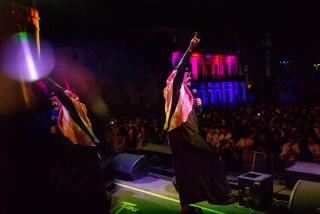Kuwaitis Fear Plot to Silence Resistance
- Share via
KUWAIT CITY — He lies in a hospital bed unable to move, unable to work, unable to do much of anything except try to remember who the man was who came to the door one night shortly after Kuwait was liberated, greeted him politely and pulled out a gun.
Hamad Jouan, a former member of Parliament and a leader of the pro-democracy movement in Kuwait, knows he had seen the man before. “ Abu Abdullah ,” the man said that night, addressing him in the familiar way a close friend might, referring to him as the father of his son. “Do you remember me?”
“No,” Jouan replied uncertainly, searching for the name in the cloudy channels of his mind. The man fired twice, hitting him once in the spine, and disappeared into the darkness and chaos of a city without lights.
Now, in the political turmoil that underlies the Kuwaiti government’s attempts to reassert control here, some members of the hard-bitten Kuwaiti resistance have become convinced that the shooting was a deliberate attempt by emir loyalists to silence the political opposition.
“It’s the only conclusion I can come up with. It’s got to be related to people who are after the pro-democracy movement,” said Abdulaziz Sultan, board chairman of the Gulf Bank and another prominent opposition leader.
Sources close to the opposition say they have uncovered evidence that a band of loyalists to the emir, Sheik Jabbar al Ahmed al Sabah--known as the “Men of Jabbar”--attempted to silence criticism of the emir within Kuwait during the occupation and threatened “elimination” of those who did not comply.
As Kuwaiti officials begin the complicated task of moving the government back from exile and getting the country running again, questions are growing here about precisely what kind of government is being reinstalled--and whether it can possibly represent the Kuwaitis who stayed behind and fended off the Iraqi occupiers through seven months of hell.
Opposition leaders are pressing Kuwait’s ruling Sabah family to end their stranglehold on power, beginning with dissolution of the Sabah-dominated Council of Ministers and immediate restoration of the Parliament and national elections.
Both Sheik Jabbar and the crown prince, Sheik Saad al Abdullah al Sabah, have pledged to restore the Parliament and hold elections as soon as possible. But government officials say it is too soon to be talking about democracy when so much of the country remains on the edge of chaos.
“Democracy will come, has to come, and there will be more democracy. But for God’s sake, let’s have a country first,” said Planning Minister Salman Abdul-Razek Mutawa.
But opposition leaders say they became discouraged about the government’s pledges to restore Parliament because it has refused to commit itself to a timetable. At a recent meeting between opposition leaders and the crown prince in Jidda, Saudi Arabia, Sheik Saad walked out of the room, they said.
Now martial law has been imposed, a 10 p.m. curfew is in effect in Kuwait city and at least one man has been detained at a checkpoint for carrying political literature in his car. “Don’t you know politics is not allowed?” he was reportedly told.
Opposition leaders say they are prepared to fight back.
“After seven months of Iraqi terror here in Kuwait, we’re not afraid of anything,” Sultan said.
More to Read
Sign up for Essential California
The most important California stories and recommendations in your inbox every morning.
You may occasionally receive promotional content from the Los Angeles Times.













